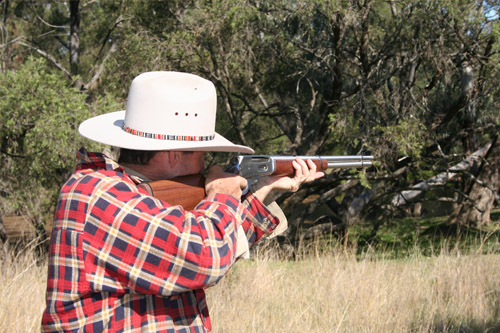
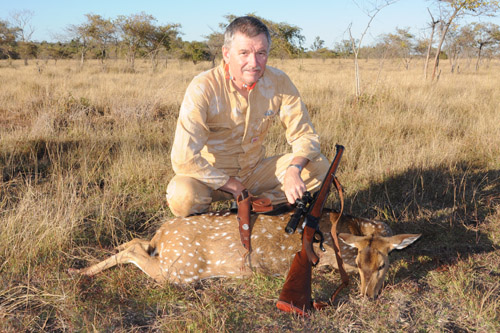
At that risk of making a controversial statement, Don Caswell says that hunting rifle accuracy can be over-rated and asks what is really important in a hunting rifle?
A lot of shooters agonise over achieving acceptable accuracy in their hunting rifles and suffer significant frustration in the process. Certainly, I did over the years. That was until I had an epiphany of sorts and changed my attitude.
Firstly, I must say that getting the best accuracy out of any rifle is a worthwhile goal, and there is a wealth of good advice available on how to achieve that. Seeking the Holy Grail of immaculate accuracy is certainly a necessary vocation for benchrest and varmint shooters.
Likewise, for those folks who are devotees to that new form of hunting, using range-finders, ballistics charts or calculators, heavy-barrelled magnum rifles and big scopes. If you aspire to slipping a 200 grain boat-tail into the shoulder of a big old boar that is 500+ metres out on the plain, then you will need all the accuracy you can muster.
200 meters is long range
However, I am an old school type hunter and I suspect a lot of hunters out there are too, even if they have not recognised that fact. For me, 200 metres IS long range! I subscribe to the closer-the-better club.
As an old school hunter it eventually became clear to me that my quest for text book accuracy in my hunting rifles was misdirected; counter-productive even. Suddenly, a lot of the old advice that I had garnered over the decades fell into place and now made good sense.
Benchrest shooters, varminters and game-snipers need read no further. The following is for old school hunters. So, what is an old school hunter? Old school hunters get out and about seeking their quarry. Encounters with game are generally random and variable. They take their shots at game from hastily assumed field positions. Generally they will be on foot, even if a vehicle or other means of transport has taken them to the area.
Old school hunters travel light, with minimal gear. Their rifle shoots flat over the ranges they intend to shoot their quarry from and they do not need to consider wind or projectile drop. The rifle is sighted to be a maximum of 50mm above the line of sight at apogee. The flat shooting range of a rifle is the distance from the muzzle to where the projectile drops more that 50mm below the line of sight.
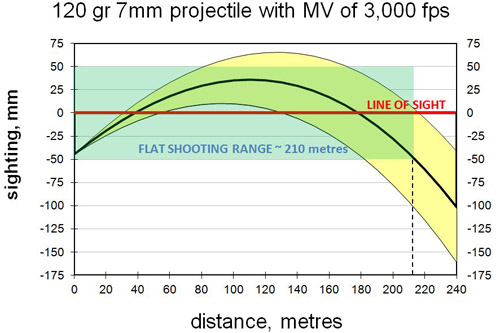
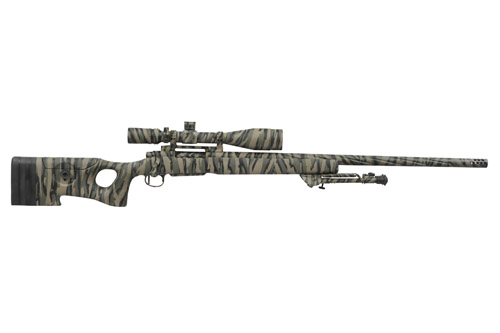
Rifle shooting range
The flat shooting range of a rifle depends on the calibre and the loading. For a 22 rimfire the flat shooting range would be about 75 metres. For a 257 Weatherby Magnum the flat shooting range is getting out to about 270 metres. My 7x57, using 120 grain Nosler Ballistic Tips, shoots flat to about 200 metres.
The field accuracy of the rifle and the shooter mean that there does not need to be any consideration of trajectory. Even with a hunting rifle of great accuracy, capable of shooting one-hole groups off the bench, there are very few shooters who could produce groups under 2 MOA from field hunting positions with such a rifle. Field position means standing, kneeling, crouching or squatting, most likely on an uneven surface, perhaps using a sapling, log, rock or other solid object as a lean; the position you suddenly find yourself in when your quarry presents for a shot that must be taken quickly, or not all.
That 2 MOA (minute of angle) translates, without getting too finicky about the technicalities, to a 50mm circle at 100 metres. That is close enough to 100mm at 200 metres and 150mm at 300 metres.
The only consideration old school hunters needs to make is simply whether the target is within the flat shooting range of their rifle, and whether they feel confident they can take the shot. That being so, the cross hairs of the reticule are place on the intended point of impact and the trigger squeezed.
Forget about the minute variations
There is no point in trying to assess minute variations in point of aim required to cater for estimates of distance and wind. Such variations are within the accuracy capability of the hunter/rifle combination and there is simply no need to try and allow for such things under normal hunting encounters.
When I finally understood that my hunting capability improved significantly. I have seen the same result in other hunters too. Once the shooter ceases to worry about minor, irrelevant adjustments to their point of aim and concentrates purely on getting the shot away, hunting success improves.
Of course, a lot of old hunters knew that instinctively and that is how they hunted. Quick target acquisition and shot taking pays off in the field. And that brings me to the other part of my revelation; accuracy.
Over the years I have owned quite a few different rifles, pretty much all hunting rifles. For a long time I laboured for the goal of accuracy as defined by ten shot groups. I used to get very frustrated by rifles that would put the first five or so shots into very promising small groups, only to blow right out by the time the tenth shot had been fired.
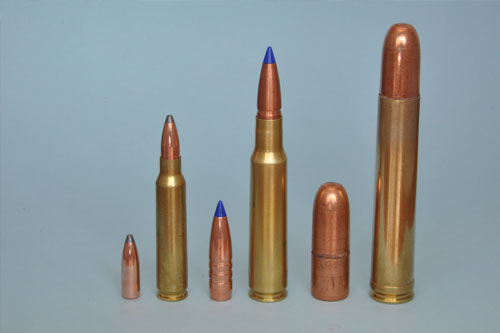
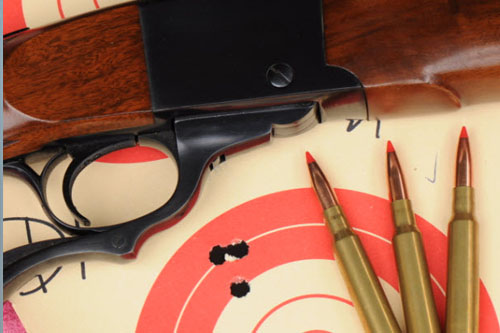
Your shooting will get better over time
Over time my shooting improved as I learnt more about re-loading, barrel cleaning and shooting technique, but I have only ever had a couple of rifles that would consistently give me sub MOA groups with ten shots. Along the way, there were experiences that I did not appreciate until much later.
A great example of that was my friend Errol’s bunny gun. We used to regularly visit local farms and spotlight hares off the lucern and bunnies from around the edges of the paddock. Our technique was to walk about with a backpack containing a car battery hooked up to a spotlight.
We generally carried a small bean bag too, which we placed on top of the big corner fence posts, as a rest for the rifle. We used a number of different rifles on these expeditions, but the outstanding performer was Errol’s Ruger No 3 carbine in 22 Hornet. It just seemed to be one of those “can’t miss” rifles you are occasionally lucky enough to find. It invariably delivered spectacular one-shot kills on hares and bunnies, right out to the limits of the spotlight.
A rifle on the range can be different to one on the field
What really intrigued me though was that, by my standards, it was not much of a performer at the range. By the time you had put 5 shots through it, the group started to widen considerably. However, what made it, and any rifle for that matter, a great hunting rifle was that those first three shots were always a clover leaf group at 100 metres.
In a game hunting situation we generally only get a chance for one or two shots in succession when an opportunity arises. The first shot would normally be deliberate, at a stationary target. Second and subsequent shots would likely be at a moving target.
Under these conditions the field circumstances over-ride the inherent bench accuracy of your rifle. In taking an off-hand shot at a fleeing pig, a rifle that can shoot 0.3MOA off the bench confers no advantage at all over a fast-handling scrub gun that only delivers 3MOA. In fact, depending on the scope, stock and balance of the rifle, your bench-accurate rifle may actually be a disadvantage.
It took me a long time to appreciate just what was really the key criteria for a reliable hunting rifle. My definition of what is acceptable accuracy for a hunting rifle now centres on three shot groups, not ten.
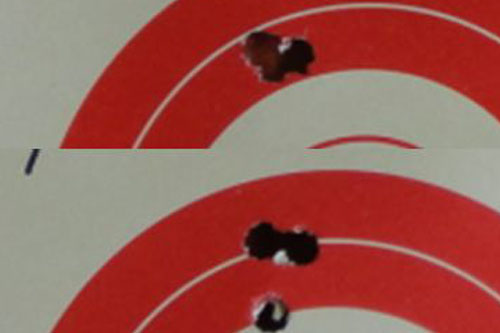
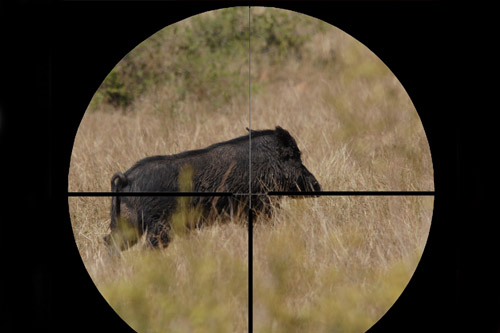
Sight your rifle in for the load you are using
While I will strive to develop loads that deliver MOA, or less, off the bench I have hunted successfully with new loads that did not group very well at all. Obviously, your rifle needs to be sighted for the load you are using and you need to know just what sort of accuracy is being achieved.
When testing new projectiles, before much load development has been done, I have gone hunting with loads I knew were only giving about 3 MOA. Under those circumstances I reduce my hunting range a little to compensate. If the projectiles performed to my satisfaction on game then I would persevere with load development, seeking to get to MOA, or better, off the bench.
The key is having the discipline to only shoot over the range you are confident of placing your shots accurately. A few months ago, a fellow came to the bench beside me at the range with a brand new rifle in 35 Whelen and a single packet of factory ammo. He was leaving the next day for a Sambar hunt in Victoria. It took him half a dozen shots to get his rifle on target at 50 metres. Then he shot another five shots to check his grouping.
The group was a large one, probably 150mm at 50 metres, which is about 12 MOA, but he was not fazed at all. He told me he expected to be shooting within 50 metres and that his new rifle was adequate for the task. He did not intend hand loading and would probably only fire a few shots a year from then on. He had no intention, or need, to seek a more accurate load in his rifle.
Selecting the correct scope for yoru rifle
For a hunting rifle, too large a scope is also a disadvantage. In hunting medium game, such as pigs, goats and deer, where encounters can sometimes be at fairly close range, a smaller scope is actually much more effective than a larger one.
For hunting purposes, lower powered scopes make for quicker target acquisition and shot taking. I use variables on my hunting rifles, 1 to 4 on the larger calibres and 3 to 9 on the rest. I always set the scopes to minimum power when hunting, and check that regularly as matter of habit.
If a higher magnification is required for a longer shot I will dial up the power for that and then reset the scope to minimum as part of the ejection procedure, before moving on. If game suddenly pops up close by, as often happens, I have a distinct advantage compared to someone with an 18X scope, for example. It can be difficult to even get your quarry in the field of view when it is close and your scope is set to high magnification. Then, when you do, all you can see is hair!
When I finally appreciated the flat-shooting aspect of various calibres, just what acceptable field accuracy was and what constituted a good hunting scope, my hunting success definitely improved.
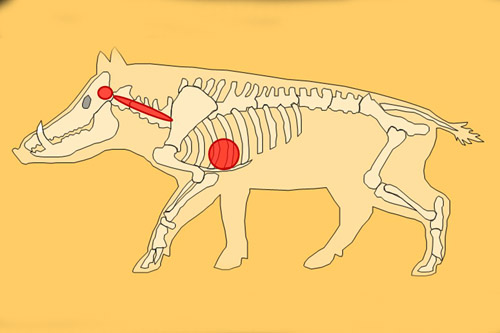
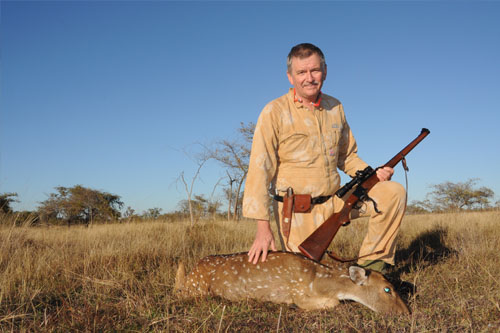
Your rifle should be well balanced
Having made that transition, I then became aware of other key requirements for a good hunting rifle. The rifle should be well-balanced and pointy. That is, it is comfortable to carry and handle, readily springing to shoulder, coming to point of aim with minimal, virtually sub-conscientious effort.
As I embraced these concepts it then began to dawn on me how important bushcraft was for successful hunting. Learning to move quietly, and slowly through the bush, with an awareness of wind and animal habits, honing my observation skills was what paid dividends. It is surprising how fast you will acquire bush skills once you open your eyes and simply pay attention!
I then finally understood the attitude of the old fellows I hunted with all those years ago, which had seemed incomprehensible to me at the time. They were totally uninterested in the technicalities of scopes, magnum calibre trajectories and bench groups. The rifle was almost inconsequential to them, so long as it was safe and functioned okay. They were largely indifferent to calibre too. But, they were outstandingly successful hunters.
The essentials for a successful hunter are to know the accuracy and range of your rifle, limit your shots accordingly, use bush skills to get close to your quarry, then kill it instantly with a well-placed shot.
Bush skills, stalking know-how and good shooting technique are far more important to being a successful hunter than single-mindedly pursuing minute ten shot groups on the range.
© Don Caswell 2012
About the author
Since 1981 Don Caswell has been a freelance writer, photographer & illustrator. Don is the author of hunting stories and the provider of technical shooting information. Don an independent reviewer of hunting, shooting & outdoors products, in addition to being a blogger & webmaster with Facebook & Instagram presence. Don is also a senior writer for the Sporting Shooters Association of Australia (SSAA) and his articles appear regularly in their publications. This article was originally published in the SSAA in April 2014.
Visit Don Caswell's Aussie Hunter Website here
